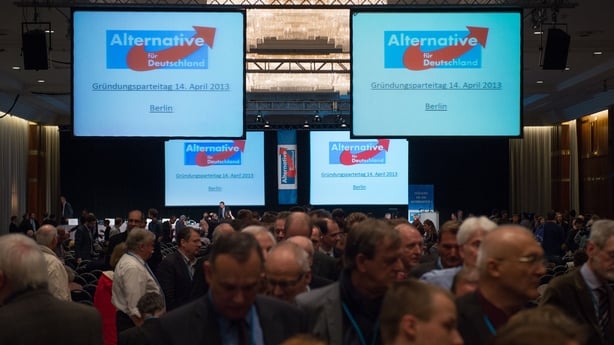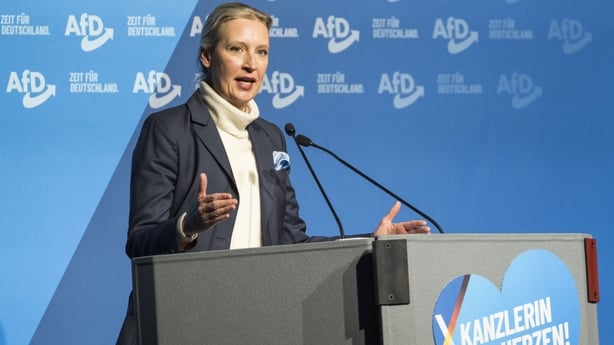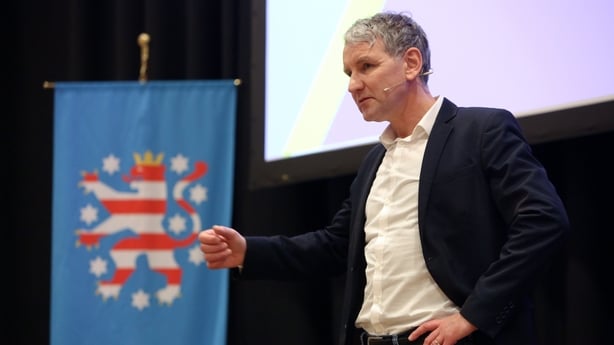Germany's far-right Alternative for Germany (AfD) party has been polling above 20% ahead of tomorrow's federal election and looks set to become the country's second largest party in the Bundestag.
That doesn’t mean it will form part of Germany’s next government.
None of the other parties set to enter the Bundestag will share power with the AfD, part of a long-standing pact among the country’s mainstream parties to keep the far-right out of power. In Germany, a country whose Nazi past still carries a heavy burden, that arrangement has been sacrosanct for decades.
However, the AfD, labelled as extremist by many of its political opponents, has already had a sizeable impact on debates over immigration in this election campaign and support for the party is polling higher than its result at the last federal election in 2021.
The party's hardline stance on immigration has forced both the centre-right CDU, led by Friedrich Merz, and the centre-left SPD, the party of current Chancellor Olaf Scholz, to tack more to the right on immigration too.

Mr Scholz’s decision to temporarily reintroduce border checks last September was a response to the changing political discourse on immigration in Germany.
The AfD currently has 76 elected representatives in the Bundestag – just under 10% of the total number of seats.
Founded in 2013 by a group of economics professors and journalists as a protest party against the euro, the AfD adopted its anti-immigration stance during the migrant crisis of 2015 and 2016.
At the time, Germany, under the leadership of chancellor Angela Merkel and her centre-right CDU/CSU-led grand coalition, welcomed more than one million refugees, mostly from the Middle East and Afghanistan.
In this year's snap election campaign, the AfD has called for the "remigration" – a term the party uses for mass deportation – of irregular immigrants. It also wants stricter border controls.
The party opposes military aid for Ukraine and wants to get rid of sanctions against Russia.
It also opposes Germany's membership of the European Union and wants a Brexit-style vote to leave the bloc, and has kept its original policy of opposing the single currency.

During the Covid-19 pandemic, the AfD opposed lockdown restrictions, arguing that it went against personal freedoms. This anti-establishment stance, along with the party's opposition to helping Ukraine, has helped the AfD to increase its support base.
That base has, until this election, been mostly concentrated in eastern Germany, the part of the country where voters feel most affected by the challenges facing Germany's struggling economy.
Piotr Buras, a Polish expert on German politics, told RTÉ News that Sunday's election is a "very important moment" for the AfD.
Mr Buras, who heads the Warsaw office of the European Council on Foreign Relations, a think tank, said that along with the small far-left BSW party, the AfD would "have a blocking minority when it comes to amendments with the constitution".
That would give the party sizeable influence to block any proposed changes to defence policy.
The AfD has had a few leaders over the past decade but things have settled down under the party's current leader and its candidate for chancellor, Alice Weidel.

Ms Weidel is a 46-year-old economist and former banker. She is lesbian and in a civil union with a Sri Lankan film producer. The couple have two children.
She is also a west German leading a party whose support base is mostly anchored in the east of the country and has broader appeal than previous AfD leaders. Its share of younger voters has grown since 2021.
Ms Weidel has fans abroad too, including Elon Musk, who has endorsed the AfD in this election, and US Vice President JD Vance.
Mr Vance met her after his appearance at last weekend's Munich Security Conference though did not meet current Chancellor Scholz, indicating that Ms Weidel has the backing of the new US administration.
The AfD includes more extremist elements though, like Björn Höcke who leads the party in Thuringia. He was found guilty and fined by a court last May for using a Nazi-era slogan during a speech in 2021.
Since 2021, Germany's Federal Office for the Protection of the Constitution (BfV) has deemed the AfD as potentially extreme. Ms Weidel has said that the BfV tries to exclude the party from the democratic process.
In January 2024, German investigative outlet Correctiv reported that AfD politicians had met in Potsdam to discuss the potential mass deportation of people of non-German ethnicity. It appalled most Germans and led to large demonstrations across the country against the AfD and far-right extremism.
However, those incidents do not appear to have dented support for the party in this campaign.
At least three attacks by immigrants in the past two months, including two car ramming attacks on large crowds that caused deaths, intensified the debate over immigration controls.
A large majority of German voters dislike, even detest the idea of the AfD getting into power.
Last weekend, after the Munich Security Conference wrapped up, I spent about an hour asking people in the snow-covered city about the issues that interested them most in this election.
Some people, rather than list an election issue, said they were worried about the AfD. One retired gentleman told me they were extremists. It's a fairly typical response from centrist voters in Germany.
But then, Bavaria is the heartland of the CSU, the sister party of Mr Merz's CDU.
Ask the same question in the AfD heartlands of Thuringia or Saxony and the response could be quite different.
The AfD is unlikely to form part of the next German government but will be a force in the next Bundestag and continue to influence how the mainstream parties approach immigration.







